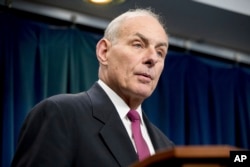The White House on Tuesday mounted a blunt defense of President Donald Trump's decision to fire the nation's top prosecutor, calling acting Attorney General Sally Yates' refusal to enforce an executive order limiting travel from seven mostly Muslim countries "bewildering and defiant."
"Ms. Yates failed to enforce a legal order...designed to protect the citizens of the United States," press secretary Sean Spicer said in defending Trump's move. Addressing reporters Tuesday, Spicer called Yates' actions "a betrayal" and said she was "rightfully removed" from office.
He also called on Democratic lawmakers in the Senate to "quit their obstruction and confirm" Senator Jeff Sessions as the next attorney general, and to approve other Trump Cabinet nominees under Senate consideration.
Earlier Tuesday, Homeland Security Secretary John Kelly also defended Trump's executive order, which suspends entry to all refugees for 120 days and bans Syrian refugees indefinitely. It also blocks people from Iraq, Iran, Libya, Syria, Sudan, Yemen and Somalia from entering the U.S. for three months.
"This is not a travel ban, this is a temporary pause that allows us to review the existing refugee and vetting visa system." Kelly said. "We can not gamble with American lives," he added.
Officials say 872 refugees will be admitted to the country because of hardship concerns, despite the order.
Yates' firing Monday came just hours after she ordered the Justice Department not to defend his executive order.
The president then immediately appointed Dana Boente to serve as acting attorney general until the Senate confirms a full-time choice.
Boente, the U.S. attorney for the eastern district of Virginia, vowed to enforce the Trump directives.
The drama that unfolded Monday began with Yates, who was appointed by former President Barack Obama, issuing written guidance to Department of Justice employees saying she was not convinced that a defense of Trump's executive order was lawful.
"My responsibility is to ensure that the position of the Department of Justice is not only legally defensible, but is informed by our best view of what the law is after consideration of all the facts," Yates said. "In addition, I am responsible for ensuring that the positions we take in court remain consistent with this institution's solemn obligation to always seek justice and stand for what is right."
House Speaker Paul Ryan also defended Trump's order Tuesday, saying "the president has a responsibility to the security of this country." He did say that "regrettably the rollout was confusing."
While campaigning last year for the presidency, Trump proposed a ban on all Muslims entering U.S. territory. He later amended his proposal to call for "extreme vetting" of people from countries with links to terrorism.
'Alarming' and 'chilling'
The president's decision to fire Yates drew objections from Democrats in Congress, including House Democratic Whip Steny Hoyer, who called the move "alarming."
"The American people need to consider whether President Trump simply plans to dismiss anyone with whom he disagrees, and I hope my Republican colleagues stand up and express concern over this as well," Hoyer said.
Senator Chuck Schumer, who described the immigration ban as "un-American," wrote on Twitter: "The AG should pledge fidelity to the law and the Constitution not the White House. The fact that this [administration] doesn't understand that is chilling."
Democratic Senator Dick Durbin, who is on the committee voting on the Sessions nomination, said if Trump's reaction to Yates is how he deals with dissent, "it's a dangerous path for America."
For his part, Republican Senator Ted Cruz, one of Trump's 2016 primary campaign opponents, strongly defended the decision to fire Yates, describing her actions as a "fitting and sad" last act of Obama's DOJ.
"President Trump was exactly right to fire an acting attorney general who refused to carry out her constitutional duty to enforce and defend the law," Cruz said.
The opposition to Trump's executive order is also coming from former officials, including a group of more than 130 who served either in the Obama administration or that of former President George W. Bush. They sent a letter Monday to the heads of the Justice Department, State Department and Department of Homeland Security expressing "deep concern" over the order that they say "will do long term damage to our national security."






